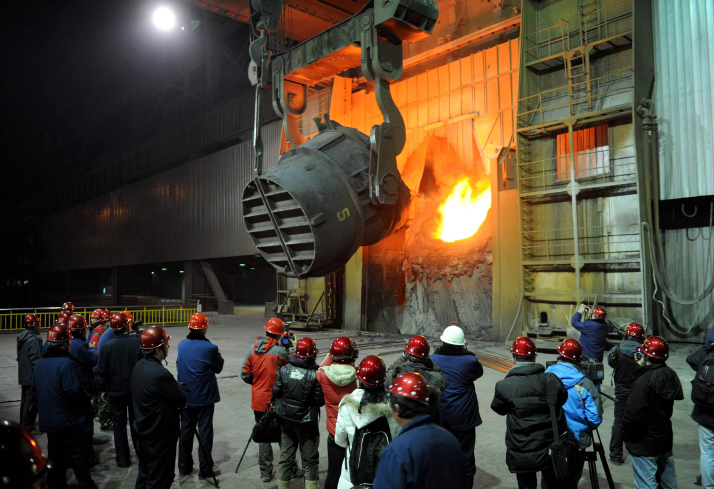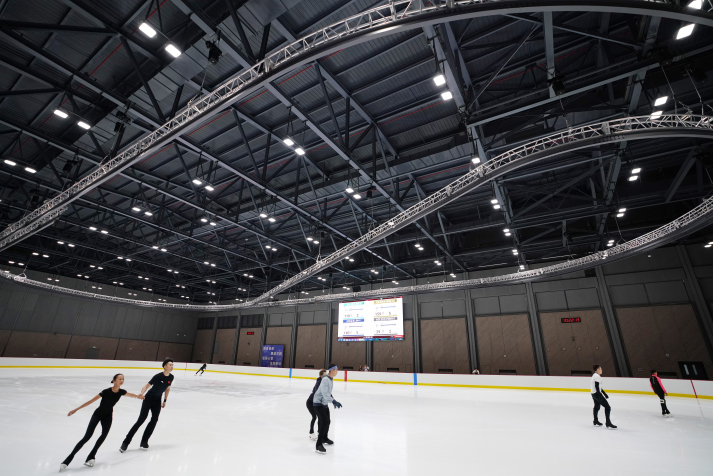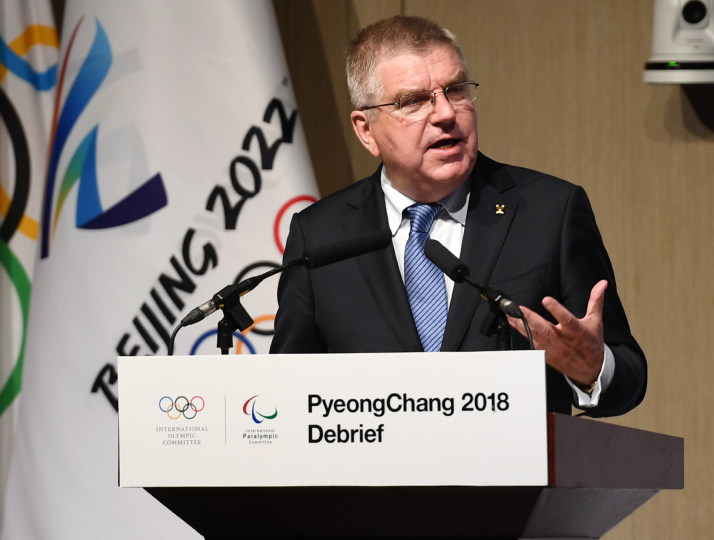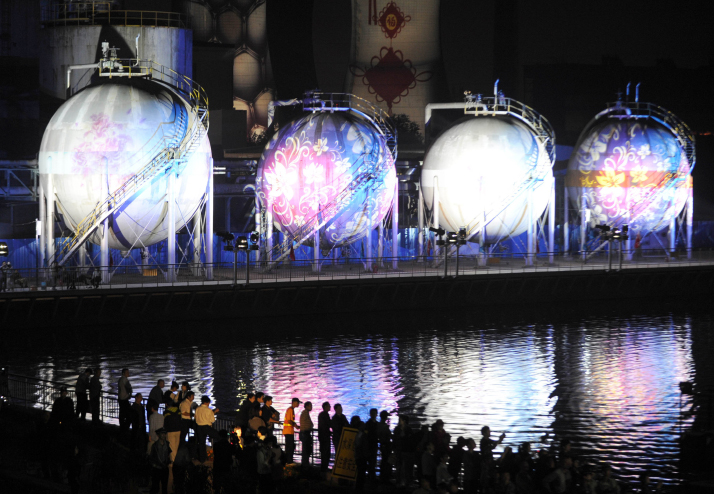| Latest News |
| Steel and Ice Team Up | |
| A century-old Beijing steel mill becomes the headquarters for the Olympic Winter Games 2022 | |
|
|
 Workers watch a furnace operate for the last time at Shougang Group's steel plant in Shijingshan District, Beijing, on December 19, 2010 (XINHUA)
Liu Boqiang, an ice maker at the newly built training center for the Olympic Winter Games 2022, starts his job before 7 a.m. every day. After working as a welder in a steel mill for more than 10 years, this job came as a big surprise to him. The training center he works in was renovated from a state-owned steel production complex with a 100-year history owned by Shougang Group. Liu began working at the steel mill after graduating from a technical school in 1996 until 2010, when the complex was removed from Beijing. "I never thought I would work in the original site of the plant again," Liu said. "I've gone from making steel to making ice." Liu compared his work transformation to that of the steel mill in recent years.
Part of the production complex of the steel mill of Shougang Group is transformed into the offices of the Organizing Committee of the Olympic and Paralympic Winter Games 2022 in Beijing (XINHUA) Established in 1919, the factory occupied 8 square km in Shijingshan District, 18 km west of Tiananmen Square along Chang'an Avenue. As one of the largest steel mills in China, it was the blast furnace center of Beijing and China's national pride. The billowing smoke from the chimneys at the mill was a typical scene in the capital for decades. Since 2005, however, this giant complex began a process of relocation, since the emissions from the plant were believed to be one of the major pollution sources in Beijing. The giant relocation project spanned five years, and it wasn't until 2010 that the whole plant was moved to Caofeidian in Tangshan of the neighboring Hebei Province. Ai Hongbo, who had been working at the steel mill for more than 10 years at the time, couldn't hold back the tears when the roaring machines stopped forever on December 19, 2010. "It suddenly got quiet," Ai said. "More than 10 workers were on duty that day and half of us cried."
Athletes train at the curling training venue in the original site of the steel mill of Shougang Group on July 27, 2018 (XINHUA) The complex was more like a self-contained city with housing, schools, canteens and a hospital. It is estimated that there were about 100,000 employees working and living at the plant at its peak. The workers, according to the relocation plan, could choose to move to Tangshan, the new mill site, or stay in Beijing and get a new job assignment at the original site, whose future development was uncertain at the time. Ai chose to move to the new site in Hebei and has commuted between Beijing and Tangshan ever since. The original site in Beijing remained idle for years, with Shougang Group still controlling it. Instead of bulldozing the site, however, an in-house design institute made several plans for its reinvention, including building it into a science park or renovating it into an art center similar to the 798 Art Zone, a modern art center in Beijing built from a complex of abandoned factories. Li Hongji, Ai's coworker, chose to stay in Beijing so that it would be more convenient for him to care for his parents. But he was not very happy with his new assignment as a security guard in the complex. Going from a proud steel worker to a security guard, Li said he felt abandoned and almost resigned. "We used to shout out to each other as the machines thundered; I enjoyed that a lot," he said. "But as a security guard, I have to wear a tie. We didn't even have to wear white shirts before. This is so different and uncomfortable for me."  Figure skaters train in a newly built venue in the original site of the steel mill of Shougang Group on July 27, 2018 (XINHUA)
Huang Jinzhi, a resident of the residential area of the mill, on the other hand, is very happy that the factory relocated even though she had four family members working at the mill at the time.
"I mopped the floor three times a day and every time it was very dirty," said Huang, recalling the time before the move of the mill. In 2003, she moved out of the residential area, but after the factory was relocated, she moved back eight years later. The 108 chimneys are still there but they do not produce smoke anymore. "There are more days with clear skies now," Huang said. As Li was deciding whether to leave his security guard post, word arrived that Beijing had won the bid for the Olympic Winter Games 2022. Li had no idea that the news would impact his work environment.  IOC President Thomas Bach speaks at the headquarters of the Beijing Organizing Committee of the Olympic and Paralympic Winter Games 2022 in Beijing on June 4, 2018 (XINHUA)
Liang Zongping, Chairperson of the Labor Union of Shougang Group, said the successful bid ignited a spark with the leading team in Shougang. "We were thinking whether the Winter Olympics could be an opportunity for the site's revival," Liang said. After evaluating the feasibility of transforming the site into an Olympic center, the Organizing Committee of the Olympic Winter Games 2022 finally decided to move their headquarters to the complex. In 2017, more venues were scheduled to be located in the old mill. The coal refining plants have been transformed into the training halls for short track speed skating, figure skating and curling. The coal station has been converted into a hockey rink. The rusted old complex started to brighten up and buzz again.  Tourists enjoy the first Shougang Lighting Festival on September 17, 2012 (XINHUA)
Olympic wonderland
In June 2018, the Olympic Organizing Committee of the Olympic Winter Games 2022 named Shougang Group—one of the largest Chinese manufacturing firm—as the Official Urban Regeneration Services Partner of the Olympic and Paralympic Winter Games 2022. "Beijing 2022 will actively promote Shougang Group and make sure that the company fully enjoys the wide range of benefits that come with the Olympic brand, so that it achieves more growth and becomes a new landmark of urban regeneration in Beijing," Zhang Jiandong, Vice Mayor of Beijing and Executive Vice President of Olympic Winter Games 2022, said at the signing ceremony. Zhang Gongyan, Board Member and General Manager of Shougang Group, said that becoming an official partner of Beijing 2022 would be a boost to Shougang's efforts to find a new model of growth. "The steel mill will certainly become a great example of urban development facilitated by the Olympic movement and of rejuvenation of industrial areas," he said. The transformation of the steel mill is happening quickly. On its official website, it states, "The formal entry of the Organizing Committee of the Olympic Winter Games 2022 has significantly improved the grade level of the park." In June 2018, the training center for speed skating, figure skating and curling was put into operation. The Snowboard Big Air venue, one of two new competition venues in the Beijing competition zone, has been completed at the site and will open in late January 2019. Thus, in 2022, the world's best snowboarders will be flying down ramps set off the side of former vast 70-meter cooling towers against the backdrop of former smokestacks. "The park will be a model of developing Olympic sports in urban areas, reusing world heritage sites and revitalizing industrial parks," the site says. Meanwhile, recreational spaces and a museum are also under construction. "In addition to our existing venues and facilities, we are working closely with the International Olympic Committee (IOC) and relevant international sports federations to address issues regarding the use of all the new facilities after 2022," said Chen Jining, Beijing's Mayor and Executive President of the Olympic Winter Games 2022 Organizing Committee. The plan won applause from the IOC. "With regard to sustainability, you only need to look around Shougang Park to realize the Chinese organizers include sustainability as a core issue in their organization," IOC President Thomas Bach said after visiting the construction site at Shougang on June 4, 2018. The reuse of existing venues, coupled with the support from the IOC in cost-effectiveness and flexibility highlighted as a new norm, will help the Olympic Winter Games 2022 in Beijing set a benchmark for future Olympics, Bach said. Ai, who will retire by 2022, said he will register to be a volunteer for the Olympic Winter Games. Li continues to work as a security guard, but is much prouder of his position, since the Olympic plan has taken effect. Meanwhile, Liu continues to work hard and his ice-making skills progress every day. "The Olympic Winter Games 2022 has created a great reunion for us," Liu said. Copyedited by Rebeca Toledo Comments to yuanyuan@bjreview.com |
|
||||||||||||||||||||||||||||
|
